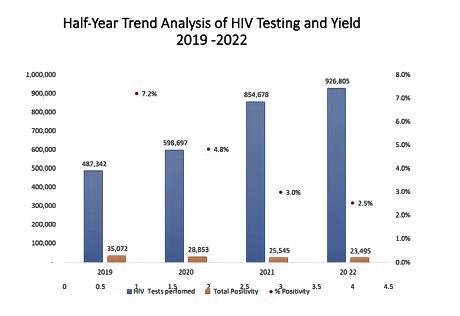A total of 23,495 people tested positive for HIV in the first half of this year (January to June).
The figure is two per cent of the 948,094 people who undertook HIV testing from January to June 2022. They were from different segments of the population, namely: men, pregnant women, non-pregnant women, homosexuals and female sex workers.
The Programme Manager of the National STIs and HIV/AIDS Control Programme, Dr. Stephen Ayisi Addo, who made this known in an interview with the Daily Graphic in Accra, said even though last year’s half year figure was 25,545, this year’s figure was too high.
The figure for this new infection is too high, so we need to intensify education to let people know that HIV is still real; it is around and there must be constant reminders. We have to let people know that they need to stick to the prevention strategies, whether they are children or adults,” he said.
He said of the number of people who presented themselves for testing, four per cent each were from the Bono, Ahafo, Eastern and Western North regions, while the Ashanti and the Greater Accra regions had three per cent each.
For the rest of the regions, he said, while some had two per cent, others had a percentage each.

Dr. Ayisi Addo said most of the 23,495 people who tested positive had since been put on HIV treatment.
Reasons for new cases
On reasons for the new cases, the Programme Manager said unlike small pox and other diseases that had been eliminated, HIV was still circulating among the population, and that as long as people had sex and were getting married, they would transmit it to others.
He said complacency and ignorance were responsible for the new cases, explaining that because health authorities were no longer making noise about the dangers of the disease, people thought there was no longer a problem.
Some youth today don't know HIV is there. Some know, but they have assumed that it’s gone. People are now more afraid of COVID-19 and the Marburg fever than they are of AIDS," he pointed out.
Overall, he said, as of December 2021, the estimated population of HIV positive persons in the country was 350,000, with only 71 per cent being identified by the control programme.
Of that number, be noted, over 245,000, representing 99 per cent, were on treatment as of June this year.
Regarding the viral suppression stage where the disease was no longer transmissible, he said about 79 per cent of those who had the disease and were taking their medication had reached that stage.
Dr. Ayisi Addo said the percentages on testing, treatment and suppression were indicative of the fact that the country was making progress in attaining the 95/95/95 testing, treatment and viral suppression rates target set by the United Nations.
What is the 95/95/95 target?
The first 95 means that by 2025, 95 per cent of the total population of persons who are HIV positive should know their HIV status.
The second 95 means that by 2025, 95 per cent of those who tested for HIV should be on medication if they tested positive, while the last 95 says that by 2025, the 95 per cent who are taking their medication should have viral suppression.
Ghana currently has achieved 71/99/79 of this target.
The reason for this is that science has shown that when people have viral suppression, which in the laboratory is read as undetectable viral load, the likelihood of transmission is almost zero, so we refer to it as U = U, meaning undetectable is equal to un-transmissible.
“If we are able to achieve that, it is like achieving head immunity in vaccination. Very soon, people will not be transmitting and, therefore, HIV will not be an issue of public health importance and that is what we are looking at by 2030,” he said.
He said he was concerned about the 29 per cent of the population who did not know their HIV status and the 21 per cent people living with HIV who had still not reached the viral suppression stage, explaining that what it meant was that those 21 per cent could still transmit the disease to their partners and other people.
He pointed out that the only way the country could reach the 95/95/95 global target was for people to test to know their status, adding that Ghana was expected to test about 1.2 million people every year.
Prevalence
Dr. Ayisi Addo said in Ghana, the prevalence of the disease was higher in men who had sex with men, with a prevalence rate of 18 per cent; female sex workers, with a prevalence of 4.6 per cent, and those who have STIs, with a prevalence of about 12 per cent, according to the last survey they did.

He said the 12 per cent prevalence recorded for those with STIs meant that if one had an existing STI, one had a higher risk of getting HIV.
This we knew earlier, and that is why our key strategy is to detect and prevent STIs, such as syphilis and chlamydia, and treat them. Because if the person is free from infection, the risk of getting HIV is low,” he explained.
Strategies adopted
The Programme Manager mentioned the strategies they had adopted to get more people to know their status to include doing strategic testing, especially among men who had sex with men and female sex workers, as well as testing high-risk men and women, including the non-paying partners of female sex workers and the wives of homosexuals.
He said they were also doing testing at STI clinics, outreach testing and facility testing.
What should be done?
Dr. Ayisi Addo called for continuous education on HIV; the Ghana AIDS Commission should continue its advocacy; NGOs should play their roles in communities, while metropolitan, municipal and district assemblies should use the one per cent fund on HIV allocated to them on the prevention of the disease and other linkage services.
Let us all work together to fight the stigma and discrimination against AIDS, so that we encourage people to go for voluntary testing and get treatment. If we do this, we can achieve our 95/95/95 target," he added.

Comments